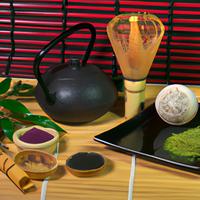
1 serving (2 grams) contains 5 calories, 0.5 grams of protein, 0.0 grams of fat, and 1.0 grams of carbohydrates.

Log this food in SnapCalorie

Nutrition Information
Calories |
588.2 | ||
|---|---|---|---|
% Daily Value* |
|||
| Total Fat | 0 g | 0% | |
| Saturated Fat | 0 g | 0% | |
| Polyunsaturated Fat | 0 g | ||
| Cholesterol | 0 mg | 0% | |
| Sodium | 0 mg | 0% | |
| Total Carbohydrates | 117.6 g | 42% | |
| Dietary Fiber | 35.3 g | 126% | |
| Sugars | 0 g | ||
| protein | 58.8 g | 117% | |
| Vitamin D | 0 mcg | 0% | |
| Calcium | 705.9 mg | 54% | |
| Iron | 23.5 mg | 130% | |
| Potassium | 3176.5 mg | 67% | |
* Percent Daily Values are based on a 2,000 calorie diet. Your daily values may be higher or lower depending on your calorie needs.
Food Attributes
Source of Calories
About Green tea matcha
Green Tea Matcha is a finely ground powder made from specially grown and processed green tea leaves, originating in Japan. Renowned for its vibrant green color and earthy, slightly sweet flavor, matcha has been a cornerstone of traditional Japanese tea ceremonies for centuries. Packed with antioxidants, particularly catechins like EGCG, matcha supports immune health and helps combat free radicals. It’s also a natural source of caffeine and L-theanine, providing sustained energy and focus without the jitters often associated with coffee. Matcha is rich in vitamins A, C, and E, as well as minerals like potassium and magnesium. However, high-quality matcha is essential, as lower-grade varieties may contain contaminants. While its nutrient profile shines, it’s best consumed in moderation, especially for those sensitive to caffeine. Whether enjoyed on its own or as an ingredient in lattes, smoothies, or desserts, matcha combines wholesome benefits with a rich cultural heritage.



